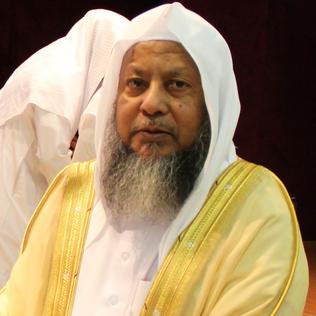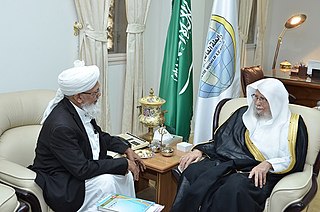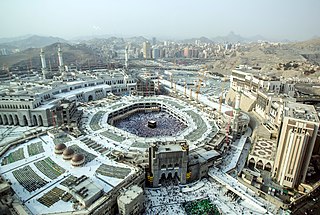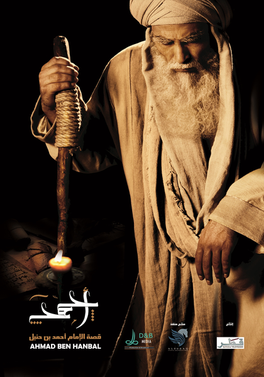
The Hanbali school or Hanbalism is one of the four major schools of Islamic jurisprudence within Sunni Islam. It is named after and based on the teachings of the 9th-century scholar, jurist and traditionist, Ahmad ibn Hanbal, and later institutionalized by his students. It is the smallest and adheres the most strictly to the traditionalist school of theology out of the four major Sunni schools, the others being the Hanafi, Maliki and Shafi'i schools.
Al-Shafi'i was a Sunni Muslim scholar, jurist, traditionist, theologian, ascetic, and eponym of the Shafi'i school of Islamic jurisprudence. He is known to be the first to write a book upon the principles of Islamic jurisprudence, having authored one of the earliest work on the subject: al-Risala. His legacy and teaching on the matter provided it with a systematic form, thereby "fundamentally influenc[ing] the succeeding generations which are under his direct and obvious impact," and "begin[ning] a new phase of the development of legal theory."
Ahmad ibn Hanbal was a Sunni Muslim scholar, jurist, theologian, traditionist, ascetic and eponym of the Hanbali school of Islamic jurisprudence—one of the four major orthodox legal schools of Sunni Islam. The most highly influential and active scholar during his lifetime, Ibn Hanbal went on to become "one of the most venerated" intellectual figures in Islamic history, who has had a "profound influence affecting almost every area" of the traditionalist perspective within Sunni Islam. One of the foremost classical proponents of relying on scriptural sources as the basis for Sunni Islamic law and way of life, Ibn Hanbal compiled one of the most significant Sunni hadith collections, al-Musnad, which has continued to exercise considerable influence on the field of hadith studies up to the present time.

The Night of Power, is, in Islamic belief, the night when Muslims believe the Quran was first sent down from heaven to the world, and also the night when its first verses were revealed to the Islamic prophet Muhammad; it is described as better than a thousand months of worshipping. According to various hadiths, its exact date is uncertain but was one of the odd-numbered nights of the last ten days of Ramadan, the ninth month of the Islamic calendar. Since that time, Muslims have regarded the last ten nights of Ramadan as being especially blessed. Muslims believe the Night comes again every year, with blessings and mercy of God in abundance.

Saud ibn Ibrahim ibn Muhammad al-Shuraim ; born 19 January 1966) is a Quranic reciter who was one of the prayer leaders and Friday preachers at the Grand Mosque Masjid al-Haram in Makkah. He also holds a Ph.D degree in Sharia at the Umm al-Qura University in Mecca. Shuraim was recently appointed as dean and "Specialist Professor in Fiqh" at the University.

'Abdallah ibn 'Alawi al-Haddad was a Yemeni Islamic scholar. He lived his entire life in the town of Tarim in Yemen's Valley of Hadhramawt and died there in 1720 CE. He was an adherent to the Ash'ari Sunni Creed of Faith (Aqidah), while in Islamic jurisprudence (Fiqh), he was a Sunni Muslim of Shafi'i school.
‘Abd al-Ghanī ibn ‘Abd al-Wāḥid al-Jammā’īlī al-Maqdisi was a classical Sunni Islamic scholar and a prominent Hadith master. His full name was Abu Muhammad Abdul-Ghani ibn Abdul-Wahid bin Alī bin Surūr Ibn Rāfi' bin Hussain bin Ja'far al-Maqdisi al-Jammāʻīlī al-Hanbali. He was born in 1146 CE in the village of Jummail in Palestine. He studied with scholars in Damascus; many of whom were from his own extended family. He studied with the Imam of Tasawwuf, Shaykh Abdul Qadir al-Jilani. He was the first person to establish a school on Mount Qasioun near Damascus. He died in 1203 CE.
Nur al-Din Ali ibn Abd Allah ibn Ahmad al-Hasani al-Samhudi, better known as Nur al-Din al-Samhudi was an Arab Sunni Islamic scholar from the 15th century. He was a well-known Shafi'i jurist, hadith scholar, mufti and historian of Medina. He is best known for his history of the city of Medina entitled Wafa al-Wafa bi Akhbar Dar al-Mustafa. He is known to be the last person to enter and clean the Inner Chamber of the prophet Muhammad's grave.

Muhammad Ayyub ibn Muhammad Yusuf ibn Sulayman Umar was a Saudi Islamic scholar, imam, and Qari known for his recitation of the Quran. He was an imam of Al-Masjid an-Nabawi and Masjid al-Quba in Medina, Saudi Arabia. He also worked as a faculty member of the Department of Tafsir in the Faculty of the Holy Qur'an and Islamic Studies at the Islamic University of Madinah and a member of the Scholarly Committee of the King Fahd Complex for the Printing of the Holy Quran. He died on 16 April 2016.
Taqi al-Din Muhammad ibn Ahmad al-Fasi was an Arab Muslim scholar, muhaddith, faqih (jurist), historian, genealogist and a Maliki qadi (judge) in Mecca.

Abdallah Ben Abdel Mohsen At-Turki is a Muslim religious leader from Saudi Arabia who has been General Secretary of the Muslim World League.
Saʻad al-Ghāmidī is a Qāriʾ and a former imam of the great holy mosque Masjid an-Nabawi. Shaykh Sa'ad al-Ghamdi has served as imam to Muslim communities across the globe.

Masjid al-Haram, also known as the Sacred Mosque or the Great Mosque of Mecca, is considered to be the most significant mosque in Islam. It encloses the vicinity of the Kaaba in Mecca, in the Mecca Province of Saudi Arabia. It is among the pilgrimage sites associated with the Hajj, which every Muslim must perform at least once in their lives if able. It is also the main site for the performance of ʿUmrah, the lesser pilgrimage that can be undertaken any time of the year. The rites of both pilgrimages include circumambulating the Kaaba within the mosque. The Great Mosque includes other important significant sites, such as the Black Stone, the Zamzam Well, Maqam Ibrahim, and the hills of Safa and Marwa.
Abdullah Awad Al Juhany, is one of the nine Imams of the Grand Mosque Masjid al-Haram in Mecca. He holds a B.A. from the faculty of Qur'an at the Islamic University of Madinah, and a doctorate (Ph.D.) from Umm al-Qura University in Mecca.
ʿAbdallāh ibn al-Zubayr al-Ḥumaydī was a hafiz, faqih from Shafi'i jurisprudence scholar and Shaykh of the al-Haram. He studied under Imam Shafi'i himself in his majlis. He also studied and narrated hadith from Sufyan ibn Uyainah and Fudhail ibn Iyadh. His pupils included Al-Aimah such as Al-Bukhari, An-Nasa'i, At-Turmudhi, Abu Zur'a al-Razi and Abu Hatim al-Razi. He died in Mecca in 219 AH.

The Imam series or Bin Hanbal series or Ahmed bin Hanbal series, is a historical television series produced by Qatar Media Foundation, which carried out the work in cooperation with Al-Buraq Qatari Media Production Company, For the Ramadan show with the participation of a large group of artists from seven Arab countries with more than 70 artists and representatives, and the implementation of the serial through documentation and dramatic treatment and film production and took the production of the series more than two years between 2015 and 2016, more than a full year.
Tāj al-Ma‘ālī Abū ‘Abd Allāh Shukr ibn Abī al-Futūḥ al-Ḥasan ibn Ja‘far al-Ḥasanī, also named Muhammad, was the fourth and last Musawid Emir of Mecca. He inherited the throne after the death of his father Abu al-Futuh in 400 AH (1010). During his reign he warred against the Banu Husayn of Medina and brought both holy cities under his control. He died in Ramadan 453 AH, He was deposed by the Sulaymanids in 403 AH (1012) AD by Abu Tayeb Daoud bin Abdul Rahman. He had one daughter; she married Abu Hashim Muhammad ibn Ja'far. Since he had no sons one of his slaves succeeded him as Emir, but the Emirate was soon captured by sharifs of the Sulaymanid dynasty. In late 455 AH (1063) Ali al-Sulayhi captured Mecca and appointed Abu Hashim Muhammad as Emir.

Ali Abdullah Saleh Jaber Al-Saeedi was the Imam of the Masjid al-Haram in Mecca and Lecturer of comparative jurisprudence in department of Islamic studies at King Abdulaziz University Jeddah. He was known for his unique and melodic Quran recitation.

Abdulbari bin Awad ath-Thubaity is an Imam and Khatib at the Prophet's Mosque, Medina. And former guest imam for taraweeh at Masjid al-Haram.
Usama bin Abdullah Khayyat, born in 1956 in Mecca, is a Saudi Islamic scholar, Imam and Preacher. He is among the current imams of Masjid al-Haram.










